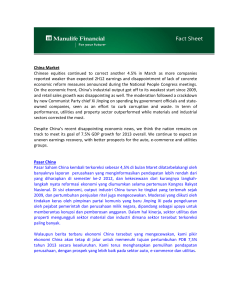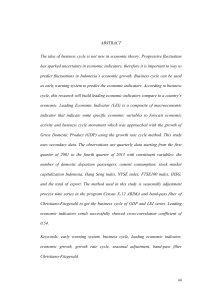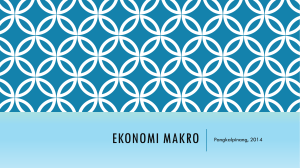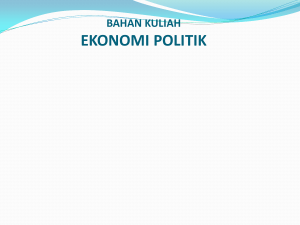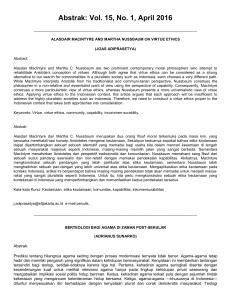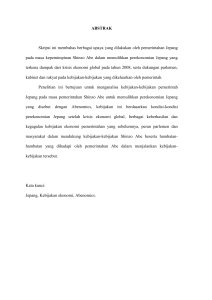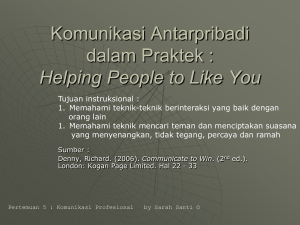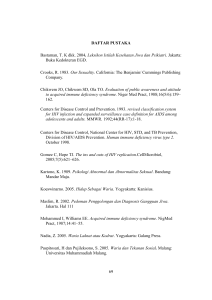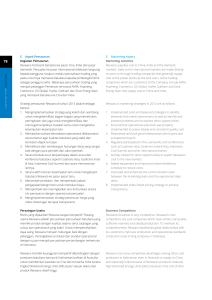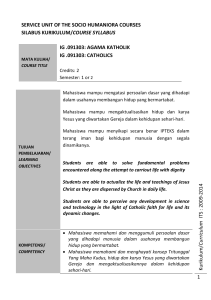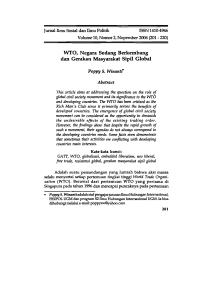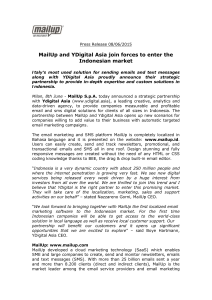Ekonomi Politik - M. Mas`ud Said
advertisement
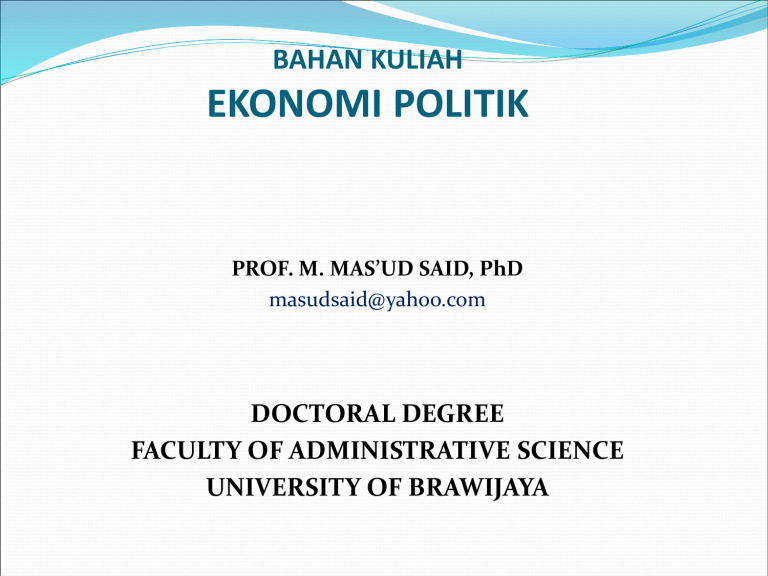
BAHAN KULIAH EKONOMI POLITIK PROF. M. MAS’UD SAID, PhD [email protected] DOCTORAL DEGREE FACULTY OF ADMINISTRATIVE SCIENCE UNIVERSITY OF BRAWIJAYA TUJUAN DAN OUTPUT KULIAH TUJUAN UMUM: MAHASISWA DAPAT MEMAHAMI TEORI EKONOMI POLITIK MAHASISWA DAPAT MENJELASKAN BAGAIMANA KETERKAITAN ANTARA EKONOMI DAN POLITIK DAN POLITIK DALAM EKONOMI MAHASISWA DAPAT MENJELASKAN BAGAIMANA EKONOMI BISA DIPENGARUHI OLEH POLITIK DAN MENGGUNAKA ILMU POLITIK SEBAGAI POINT OF VIEW PEMBANGUNAN EKONOMI OUTPUT KULIAH: PADA AKHIR KULIAH, MAHASISWA MEMBUAT MAKALAH BERSTANDAR JURNAL NASIONAL. PADA AKHIR KULIAH, MAHASISWA DAPAT MENJELASKAN BAHWA SISTEM POLITIK, SISTEM HUKUM DAN IDEOLOGI BERPENGARUH PADA PEMBANGUNAN EKONOMI DEFINISI EKONOMI POLITIK Ekonomi Politik adalah studi interdisipliner. Ekonomi Politik adalah cabang ilmu yang mempelajari ekonomi dg perspektif ilmu politik. Ekonomi Politik mendalami bagaimana institusi politik, lingkungan politik dan kapitalisme dapat saling berpengaruh antara satu dengan lainnya. In the present, political economy refers to a variety of different, but related, approaches to studying economic and political behavior, which range from combining economics with other fields, to using different fundamental assumptions which challenge those of orthodox economics: EKONOMI POLITIK: STUDI INTERDISIPLINER ADALAH ILMU MENGENAI RELASI EKONOMI DALAM MAKNA PEMENUHAN KEBUTUHAN MASYARAKAT DENGAN YANG DIPENGARUHI OLEH KEBIJAKAN NEGARA ,KEKUASAAN DAN POLITIK DAN PENGARUH LINGKUNGAN DOMINAN LAINNYA. WALAUPUN BEGITU PENGERTIAN EKONOMI POLITIK PUNYA MAKNA YANG SANGAT LUAS. IA BAHKAN MENYANGKUT RELASI SOSIAL, PENGEMBANGAN TEKNOLOGI , HUKUM YANG BERPENGARUH TERHADAP EKONOMI Political economy is most commonly used to refer to interdisciplinary studies that draw on economics, law, and political science in order to understand how political institutions, the political environment and capitalism influence each other. Perbandingan antara “Ilmu Ekonomi” dengan “Ekonomi Politik” Ilmu Ekonomi Ansich, mempelajari pemenuhan kebutuhan manusia, produksi, konsumsi dari perspektif penggunaan modal ekonomis seperti tanah, tenaga kerja dan proses produksi dan distribusi melalui pasar. Ekonomi Politik meletakkan Ekonomi sebagai pergumulan antara kebijakan negara, politik, hukum, lingkungan sosial dan ideologi politik dengan proses ekonomi konvesional Within political science, the term Political Economy refers to modern liberal, realist, Marxian, and constructivist theories concerning the relationship between economic and political power among states. This is also of concern to students of economic history and institutional economics. PERBANDINGAN EKONOMI DAN EKONOMI POLITIK IN ECONOMIC TERMS, the aforementioned DEFINITION OF DEVELOPMENT indicates that for the population of a country, there are employment opportunities, satisfaction -at least- of basic needs(food, education, health, shelter, clothes, milk) and the achievement of a positive rate of distribution and redistribution of national wealth.. Economists often associate the term with approaches using game theory Others, especially anthropologists, sociologists and geographers, use the term "political economy" to refer to neo-Marxian approaches to development and underdevelopment set forth by Andre Gunder Frank and Immanuel Wallerstein Ekonomi Politik, Ekonomi Kelembagaan Ekonomi Politik mempelajari perkembangan politik kemasyarakatan dan ekonomi negara. Jadi Ekonomi Politik mempelajari bagaimana umat manusia memproses sumber ekonomi dan makanisme distribusi hasil ekonomi baik dalam kondisi kekurangan maupun dalam kondisi kelebihan dari proses tersebut. Political economy is centrally focused on the development of the polity. Political economy, then, studies the mechanism of human activity in organizing material, and the mechanism of distributing the surplus or deficit that is the result of that activity. Note the difference between this paradigm and that of economics which sees human wants as unlimited, resources as generically scarce, historical context as not particularly important, and income distribution issues as less important than efficiency and growth. While for some there is no difference between the two terms, for others the difference is one of basic method. Economics studies trade-offs through measurable values, whereas political economy focuses on structural relationships. However, there is no generally accepted distinction between these terms, and they are most often used on a case by case basis. EKONOMI POLITIK LEBIH DARI SEKEDAR PROSES PRODUKSI Tidak sama dengan ekonomi konvesional atau ekonomi Orthodox, Ekonomi Politik mempelajari hal hal yang tak hanya berkaitan dengan proses produksi dan pengelolaan sumber daya alam, namun ia adalah hal hal yang lebih luas, semisal bagaimana faktor tenaga kerja manusia, dan juga teknologi berperan penting pada masa era sesudah “ekonomi klasik’ dimana faktor hukum negara dan ideologi politik sangat besar perannya dalam ekonomi bangsa. In contradistinction to the economic theory, in which land was seen as the source of all wealth, some political economists proposed the labour theory of value (first introduced by John Locke, developed by Adam Smith and later Karl Marx, according to which labour is the real source of value. Many political economists also attracted attention to the accelerating development of technology whose role in economic and social relationships grew ever more important. Political Economy Awalnya, setidaknya akhir abad 19, istilah Ekonomi Politik bereitan erat dan tak lepas dari istilah ekonomi pada umumnya, khususnya saat ahli matematika ekonomi dan studi filsafat ekonomi muncul saat perkembangan setelah ekonomi konvesional yang hanya mempelajari hubungan struktural dalam konteks produksi dan konsumsi. Namun kini Ekonomi Politik -walalupun masih berkaitan erat dengan pandangan ekonomi umum- namun telah berkembang jauh pada tataran konteks hubungannya dengan perilaku politik yang menghubungkan atau memakai pendekatan selain ilmu ekonomi dimana ia justru merubah asumsi asumsi konvensional pada umumnya. In the late 19th century, the term "political economy" was generally superseded by the term economics , which was used by those seeking to place the study of economy on a mathematical and axiomatic basis, rather than studying the structural relationships within production and consumption. (See Marginalism . Alfred Marshall) In the present, political economy refers to a variety of different, but related, approaches to studying economic and political behavior, which range from combining economics with other fields, to using different fundamental assumptions which challenge those of orthodox economics: •Political Economy Political economy is most commonly used to refer to interdisciplinary studies that draw on economics, law and political science in order to understand how political institutions, the political environment and capitalism influence each other. Within political science, the term refers to modern liberal, realist, Marxian, and constructivist theories concerning the relationship between economic and political power among states. This is also of concern to students of economic history and institutional economics. BANDINGKAN DENGAN TEORI EKONOMI KLASIK Pada umumnya saat orang belajar Ilmu Ekonomi di Fakultas Ilmu Ekonomi, maka orang akan pasti mempelajari Buku Utama yang ditulis oleh ADAM SMITH, 1776, yang berjudul An Inquiry into the Nature and Causes of the Wealth of Nations. Buku ini sangat berpengaruh bahkan menjadi paradigma mahasiswa dan dosen serta semua kajian yang meyakini bahwa campur tangan peraturan pemerintah (khususnya di Eropa barat) saat itu bisa merusak pertumbuhan ekonomi negara dan juga mengurangi kesejahteraan masyarakat. Smith argued that the form of regulation made by the government in Western Europe in the eighteen centuries as detrimental to the economic growt of the country and greater wealth for all citizen. He also believed that the proposed system would be regulated by the invisible hand of the market rather than the state. Individual will act in self interest.... CLASSICAL AND NEO LIBERAL ECONOMIC DEVELOPMENT THEORIES ADAM SMITH AND THE FREE MARKET, TRADITIONAL PRE CONDITION for TAKE OFF KEYNESIANISM MODERNIZATION THEORIES, TAKE OFF DEVELOPMENT AID, DRIVE TO MATURITY MASS HIGH CONSUMPTION NEO LIBERALISM Ruang Lingkup Ekonomi Politik Kebijakan Ekonomi Ekonomi Strategi pembangunan Politik Keberpihakan Ide ide dasar kesejahteraan Paradigma Pembangunan Giovanni E. Reyes, 2008 Reyes defines development with respect to the stage of intended social, economic and political conditions achieved by a nation. Therefore, Reyes believes that definition of development could be seen in many respects; Economic, Social and Political. Kattie Wlilis, 2005;3 People look at development largely in economic term. For example The World Bank uses Groos National Product (GNP) to divide the country of the world in to development categories. Low income countries are defined as those with US$ 745 or less, lower – middle income have US$ 746-2,975 and upper-middle income countries are those with GNP 2,976 – 9,205 and high income countries are those with GNP US$ 9, 206 or more Traditional economics, is concerned primarily with the efficient, least cost allocation of scare productive resources and with the optional growth of these resources over time so as to produce an ever-expanding range of good and services PERUBAHAN Definisi Ekonomi dan Pembangunan Setelah Munculnya Ekonomi Politik. Ideas of development are linked to concepts of modernity. Modernity in its broader sense means the condition of being modern, new or update, so the idea of modernity situates people in time ( Katie Wilis , Theories and Practices of Developmet, 2005) In economic term modernity encompasses industrialization, urbanization and the increased use of technology within all sectors of economy. (Katie Wilis (Theories and Practices of Developmet, 2005) ILMU YANG BERKAITAN DENGAN EKONOMI POLITIK SOSIOLOGI POLITIK DEMOGRAPY DAN GOOPRAFI PSIKOLOGI ILMU EKONOMI SEJARAH HUKUM 16 Ekonomi Politik, Multi Disiplin Economics, because it studies activity and price relationships and the effects of scarcity, grew out of political economy. It is often used in political economy to argue policy effects and study the results of actions, and it is often in opposition to political economy, in that many, if not most, practicing economists see political economy as being a hindrance to the operation of economic forces. From the point of view of political economy, economics is a branch of the entire study, and economics has, at its basis, a theory of political economy which should be open to examination. Law since it concerns the creation of policy, or the mediation of policy ends through political acts which have specific individual results, is seen, in political economy, as both political capital and social infrastructure, on one hand - and as the result of the sociology of a society on the other. Human Geography concerned, amongst others, with economic and political processes with an emphasis on spatial and environmental aspects thereof. Ecology is often involved in political economy, because human activity is one of the single largest effects on the environment, and because it is the suitability of the environment for human beings which is one of the central concerns of most human beings. The ecological effects of economic activity on the environment have spurred the creation of a great deal of research studying means of changing the incentives balance of the market economy. This work is particularly controversial in its interaction with economics, since it questions the fundamental econometric assumptions of market economics and their basic validity. See the commons. Ekonomi Politik, Multi Disiplin Sociology is the study of the effects of involvement in society on individuals as members groups, and how this changes their ability to function. Many sociologists begin from a framework of production determining relationship drawn from Karl Marx. Anthropology often studies political economy by studying the relationship between the world capitalist system and local cultures. Psychology is frequently the fulcrum around which political economy centers, in that it deals with decision making, not as being a black box whose effects are seen only in price decisions, but as being a source of study, and therefore the assumptions in a model of political economy. History since it documents change over time, is often used as a means of arguing in political economy, and often historical works have a framework of political economy which they assume or argue as the basis for the narrative structure. Ekonomi dan Sosiologi Post modern Modern, ultra modern Transisi tradisional menuju modern Primitive Tradisional Economy dan Sosiologi: The Future Back to nature : gejala umum di AS, di Eropa di Jepang dan beberapa negara ekonomi maju Back to basic: gejala umum dan menjadi trend orang modern orang lebih enjoy hidup di Kampung, merasa segar kalau berada di gunung, menggelar tikar, tinggal di pantai yg natural, menyukai huma, cottage, suka terhadap atraksi budaya dan tradisi Simplicity, simpel life, tai chi, yoga, sholat dhuha Back to religion, agama akselerasinya cepat di AS, Australia, Inggris, Jepang, China dlsb Seeking soul peace, kesejatian, Transendental, Kajian Sosiologis Keseimbangan Global Dalam Ekonomi: Statement 1: “We have collective responsibility to uphold the principles of human dignity, equality and equity at the global level” (United Nation, Millennium Declaration, September 2000, Signed by the 189 UN member countries) Statement 2: “As leaders we have a duty therefore to all the world’s people, especially that most vulnerable, in particular, the children of the world, to whom the future belongs.”(United Nation, Millennium Declaration, September 2000, Signed by the 189 UN member countries) Bahan 2 HUBUNGAN ANTARA EKONOMI DAN POLITIK Politics is a process by which groups of people make decisions. Politik, segala sesuatu yang berkaitan dengan negara dan kehidupan warga negara. Politik, segala sesuatu yang berkaitan dengan kekuasaan dan pengambilan keputusan dalam negara. KAJIAN TENTANG HASIL DAN PROSES PEMBANGUNAN EKONOMI DI SUATU NEGARA BANYAK ATAU SETIDAKNYA DIPENGARUHI OLEH POLITIK Ekonomi dan Ilmu Politik As political scientist Harold Lasswell said, politics is "who gets what, when and how." Politik itu berkisar pada gejala dan proses siapa mendapat apa, kapan dan bagaimana cara memperolehnya. Sedangkan Ilmu Ekonomi banyak membicarakan bagaimana aktor aktor dalam negara (sebagai produsen, konsumen maupun penyalur) berinteraksi sehingga dalam kacamata ekonomi akan didapat angka siapa mendapat apa dan bagaimana. BEBERAPA CONTOH IDEOLOGI POLITIK DAN PENGHARUHNYA ATAS EKONOMI PADA NEGARA DEMOKRASI YANG MENGANUT SISTEM LIBERAL, MAKA KONDISI EKONOMI NEGARA AKAN BERLANGSUNG TATA CARA LIBERALIME DAN DEMOKRASI, CONTOHNYA USA, AUSTRALIA, CANADA, EROPA, INDONESIA PADA NEGARA YANG MENGANUT SISTEM DEMOKRASI SOSIALISTIK, MAKA KONDISI DAN SISTEM PERDAGANGAN JUGA MENGANUT SISTEM DEMOKRASI SOSIALISTIK. CONTOHNYA CHINA, GERMANY, HAL YANG SAMA TERLIHAT DI NEGARA DENGAN SISTEM COMMUNISM SEPERTI , KORUT, SOVIET, CHINA, CUBA, ATAU SISTEM CONSERVATISM SEPERTI, IRAN ATAU NATIONALISM CAMPURAN ; MALAYSIA, INDONESIA, ATAU RELIGIOUS FUNDAMENTALISM, IRAN, IRAQ, AFGANISTAN, PAKISTAN Power dan Economy Robert A. Dahl: “A has power over B to the extent that he can get B to do something that B wouldn’t otherwise do.” (Dahl 1957, p. 203). “ A memiliki kekuatan atas B dalam keadaan A dapat meminta B untuk berbuat sesuatu walaupun B tidak setuju untuk melakukannya” Nelson W. Polsby: Power should be analyzed by investigating “…who participates, who gains and who loses from alternative outcomes, and also who prevails in decision making.” (Polsby 1970, p. 3f). Kekuasaan harus dianalisis dengan cara mencari tahu “ siapa yang terlibat, siapa yang mendapat keuntungan dan siapa yang dirugikan dari pilihan yang ditetapkan dan juga siapa yang tetap dalam proses pengambilan keputusan” Makna Political Power (DALAM EKONOMI) ARAH EKONOMI BESARAN EKONOMI POLITIK MEKANISME DISTRIBUSI KONTROL EKONOMI NEGARA EKONOMI Bahan 3 PARADIGMA EKONOMI POLITIK Political economists are divided over the nature of two paradigms: the paradigm of distribution and the paradigm of production. These paradigms may be related, especially at the extremes, but there are a vast number of individuals who hold almost diametrically opposite views on these two paradigms in the same context. Ahli ekonomi politik memiliki pendapat yg berbeda atas dua paradigma: paradigma distribusi dan paradigma produksi. Keduanya sesungguhnya saling berhubungan namun beberapa diantaranya malah berhadap hadapan satu dengan lainnya dalam kaitan hal yang sama. Paradigma Distribusi LIBERALISME, CONSERVATISME, SOSIALISME, LIBERTARIANISME, COMMUNISM Bahan 4 Pembangunan Ekonomi Dunia Evaluasi Pembangunan Dunia PERKEMBANGAN PENDEKATAN PEMBANGUNAN EKONOMI DECADE MAIN APPROACHES 1950s MODERNIZATION THEORIES, FOLLOWING EUROPEAN MODELS STRUCTURALIST MODEL 1960s MODERNIZATION THEORIES, dependency theories: Southern countries poor because of exploitation by Nothern countries 1970s DEPENDENCY THEORIES, basic need approaches, government should provides the basic needs of the poorest people 1980s NEO LIBERAL, focus on Market, lower level involvement of government in economics activities GRASS ROOT APPROACHES, considerning local context SUSTAINABLE DEVELOPMENT, need to ballance needs of current generation against environtmental, future generations GENDER MAINSTREAMING, MAIN APPROACHES TO DEVELOPMENT DECADE MAIN APPROACHES 1990s NEO LIBERAL MODELS, POST DEVELOPMENT, ideas about development represent colinilaism and Eurocentrism SUSTAINABLE DEVELOPMENT CULTURE AND DEVELOPMENT, awarenes of how diferent social and cultural group afected by development 2000s NEO LIBERALISM, increased engangement with concept of globelization SUSTAINABLE DEVELOPMENT POST DEVELOPMENT GRASS ROOT APPROACHES BAHAN 5 MDGS International Development Goals: Attacking Poverty The World Bank Report 2000 Reduce the proportion of people living in extreme poverty by half between 1990-2015 Enroll all children in primary school by 2015 Make Progress towards gender equality and empowering women.. Reduce infant and child mortality Reduce maternal mortality ratio Provide access for all who need reproductive health service by 2015 Implement national strategies for sustainable development Distribution of population on less than $1 a day 1998 (1,2 billion) Europe and Central Asia 2.0% Latin America and Caribbean 6.5% East Asia and Pacific 23.2% Sub-Saharan African 24.3% South Asia 43% Middle-east and North Africa 0.5% data If the developed country donates their GDP more 1%, it will be able to uplift 1 billion people who live in poverty The world’s richest 500 individual equal with 416 million 2.5 billion people living with less than 2 $ a day, Important (moral) Enquiries to the Meaning of Development “What is the meaning of the growth if it is not translated into the lives of the people?” (United Nation Development Program, Human Development Report 1995) The statement of The World Bank President “Our primary goal in development must be reduce the disparities across and within countries….The key development challenge of our time is the challenge of inclusion” (James. D. Wolfensohn, President, The World Bank) James D. Wolfensohn The President of The World Bank, 2000 He stated in 2000 that “ Poverty amid plenty is the world’s greatest challenge” Wolfensohn, then recommended actions in the three areas: Promoting Opportunity: Expanding opportunity for the poor by people Facilitating empowerment: Making state institutions more accountable and more responsible to the poor Enhancing Security: Reducing poor people vulnerability to ill health 1. 2. 3. ACTORS IN SOCIAL. ECONOMY AND POLITICS 1) INDIVIDUAL, youth, students, artists, 2) HOUSEHOLD, COMMUNITY, peasant, 3) GOVERNMENT, POLITICAL PARTIES 4) NON –GOVERNMENT ORGANIZATION 5) PRIVATE COMPANIES, government owned companies 6) MULTILATERAL ORGANIZATION, 7) CULTURAL GROUPS, urban society, rural society 8) ACADEMICS, EDUCATIONS; UNIVERSITY 9) Cultural and relegious leaders 10) Mass media, bureaucracy, professionals, investors, commuters, workers, Contoh Struktur Ekonomi Politik (fisik - alamiah) • Kondisi alam terisolir, sulit dijangkau • SDM dan budaya kerja rendah • Jumlah penduduk miskin besar • Infrastruktur minim • Makanan, tempat tinggal apa adanya • Rentan penyakit • JENIS KEMISKINAN: ALAMIAH, KULTURAL DAN STRUKTURAL JADI SATU Lokasi, demografi, populasi, tradisi KULTUR POLITIK dan kultur ekonomi Keyakinan dan pandangan masyarakat tentang kekuasaan, negara dan posisi pemimpin mereka. Pola hubungan masyarakat dengan negara dan proses politik. Bagaimana sebaiknya pemimpin memberikan dan menggunakan kekuasaan Habbit dalam memilih dan mereaksi kondisi politik.Konsekuensi apa yang terjadi atas sesuatu kegiatan politik. Pandangan mesyarakat tentang baik dan buruk, apa yang seharusnya dan apa yang tidak seharusnya dalam pencapaian tujuan bersama Pandangan masyarakat terhadap sumber sumber kekuasaan dan siapa yang disebut pemimpin. THEORIES OF DEVELOPMENT KATIE WILIS CLASSICAL AND NEO LIBERAL DEVELOPMENT THEORIES STRUCTURALISM DEVELOPMENT THEORY NEO MARXISM AND SOCIALISM THEORY GRASS ROOT DEVELOPMENT Pemimpin, berbagai strategi pembangunan ekonomi Political Ideology and Development • KLUSTER 2 • KLUSTER 1 • BANTUAN DAN PERLINDUNGAN SOSIAL RUMAH TANGGA MISKIN PROGRAM PRO RAKYAT 4 KLUSTER • PROGRAM NASIONAL PEMBERDAYAAN MASYARAKAT (PNPM) KLUSTER 4. KLUSTER 3. • KREDIT USAHA RAKYAT (KUR) • MELALUI 7 BANK NASIONAL RUMAH MURAH KENDARAAN MURAH AIR MINUM LISTRIK MURAH M Mas’ud Said M MAS’UD SAID Guru Besar Ilmu Pemerintahan. Asisten Staf Khusus Presiden RI Bidang Pembangunan Daerah dan Otonomi Daerah Email [email protected] Web: profmmasudsaid.com M. Mas’ud Said
